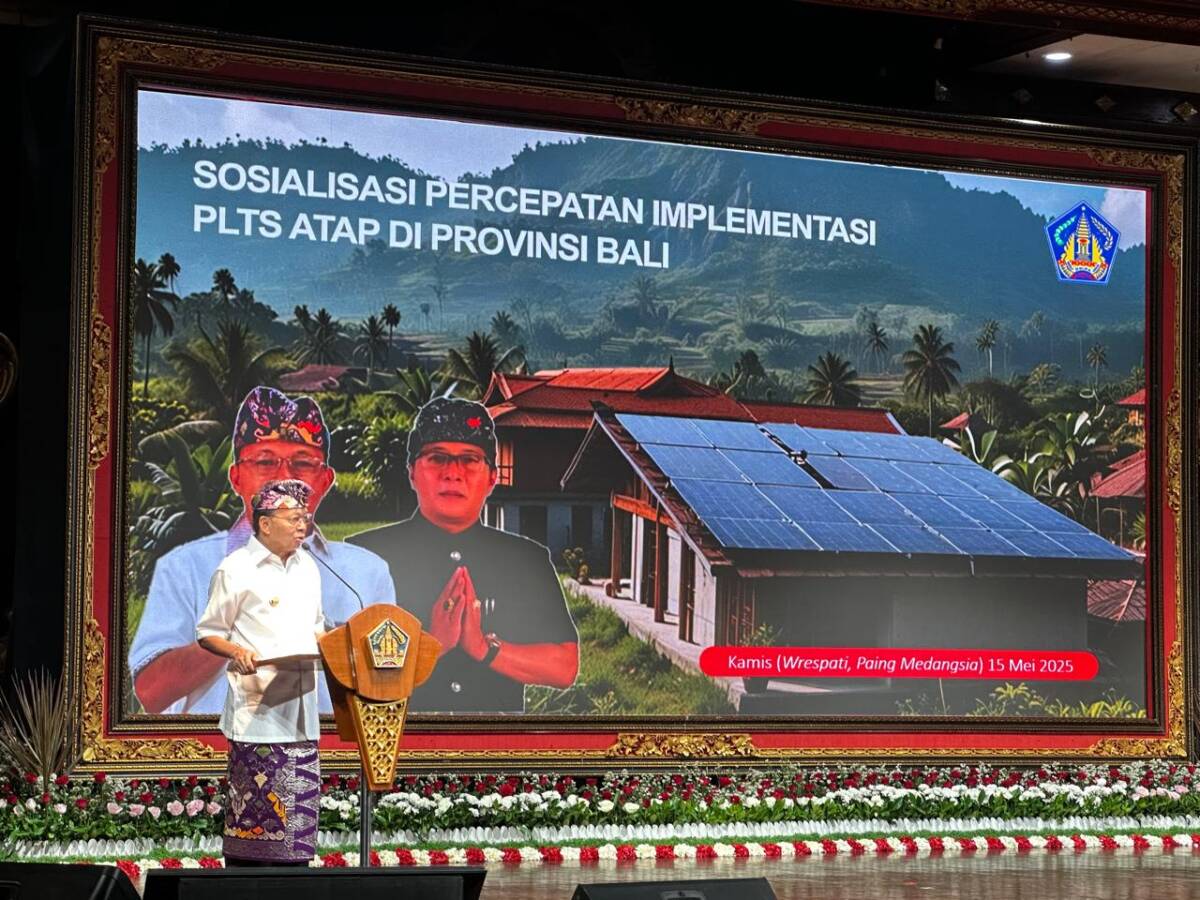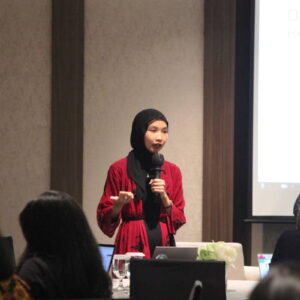Denpasar, May 15, 2025 – Bali Governor I Wayan Koster today launched the Acceleration of Rooftop Solar Power Utilization to achieve Bali Energy Independence, one of his flagship programs. The Institute for Essential Services Reform (IESR) welcomes this initiative and sees it as a progressive step to encourage energy independence based on local resources while accelerating the transition to a clean energy system and sustainable development to realize Bali Net Zero Emission 2045, which was launched by Governor Koster and IESR in July 2023.
Bali has enormous solar energy potential, reaching 22 GW based on IESR analysis, with Rooftop Solar Power potential reaching 3.3 – 10.9 GW. However, until now its utilization is still very limited, less than 1% of the existing potential. On the other hand, Bali’s dependence on fossil-based electricity supplies, including the dependence on the Java-Bali submarine cable of 400 MW, shows the vulnerability of the current energy system. Rooftop PLTS is considered a fast, flexible solution that fits the geographical conditions and socio-economic structure of Bali which is spread out to improve the security of energy supply in Bali.
Bali Governor, I Wayan Koster delivered a directive to accelerate the utilization of Rooftop PLTS especially in government buildings, public facilities, and the business sector in Bali on Thursday (15/5). This is one of the 3 directions of the Governor’s policy to realize Bali’s Energy Independence with clean energy.
“All provincial, district, and city government offices must use Rooftop PLTS. Also all hotels, villas, schools, campuses, and markets,” said Wayan Koster.
Head of the Bali Province Manpower and Energy and Mineral Resources Agency, Ida Bagus Setiawan, emphasized that this acceleration will contribute to increasing the renewable energy mix in Bali and the commitment to action for Bali NZE 2045.
“If the acceleration of the use of Rooftop Solar Power Plants is carried out massively, the renewable energy mix will increase significantly. Thus, the Bali NZE 2045 target is not just a discourse, but a goal that can truly be achieved,” said Ida Bagus Setiawan.
IESR Executive Director, Fabby Tumiwa stated that the construction of large-scale distributed power plants such as Rooftop Solar Power Plants equipped with battery energy storage systems (BESS) is a fast and cheapest way to increase the source of electricity supply on the island of Bali in increasing energy supply security, reducing the risk of electricity supply failure from Java due to disruption of interconnection cables which currently supply 25 to 30 percent of electricity in Bali.
“Rooftop Solar Power Plants and BESS can also be a solution to manage the high rate of electricity demand after the pandemic, and reduce the pressure on PLN to add new supplies to meet the adequacy of electricity supply,” said Fabby.
The use of Rooftop Solar Power Plants not only supports the achievement of Bali’s Energy Independence, but also strengthens the realization of Bali’s commitment to achieving net-zero emissions (NZE) by 2045. In various IESR studies with CORE Udayana University, including Nusa Penida 100% Renewable Energy 2030 and Bali NZE Roadmap 2045, Rooftop Solar Power Plants are the key to increasing the renewable energy mix, especially in the building sector. The massive use of Rooftop Solar Power Plants contributes to electricity cost savings, the creation of new green jobs, and expanding community participation in the energy transition.
Prof. Ida Ayu Dwi Giriantari, Chair of CORE Udayana University (UNUD) said that it is impossible for Bali to continue adding conventional power plants without limit. If the addition of power plants continues without a strategy, eventually the space for new power plants will run out. Therefore, demand side management is crucial.
“One of them is through the use of Rooftop Solar Power Plants and the construction of distributed solar power plants. In addition to being more efficient in terms of space, this approach is also more environmentally friendly. This is the reason behind the acceleration program for the use of Rooftop Solar Power Plants, so that the development of clean energy can meet the needs and support the achievement of Bali Net Zero Emission 2045,” said Prof. Ida.
IESR recommends that the Government support this initiative and also revise ESDM Regulation No. 2/2024 which regulates Rooftop Solar Power Plants to revoke the quota system and reintroduce the net-metering scheme and the use of Rooftop Solar Power Plants with BESS, for Rooftop Solar Power Plants for industrial and commercial buildings. This revision will open up wide opportunities for electricity consumers in Bali and throughout Indonesia to install Rooftop Solar Power Plants as distributed generators and strengthen energy security in Indonesia.
Bali as the center of culture and tourism in Indonesia, can be a real example of a just and community-based energy transition. Rooftop PV is not only a technical solution, but also a symbol of citizen participation in saving the earth. To realize this, IESR encourages the expansion of collaboration between local governments, PLN, educational institutions, local communities, businesses, and civil society organizations.
Accelerating the adoption of Rooftop PV will be a crucial step in making Bali Mandiri Energi not only a flagship program of the Governor, but also a collective movement of all Balinese people towards a clean, resilient, and sustainable future that can inspire Indonesia to achieve decarbonization of the energy system by 2060 or earlier.



